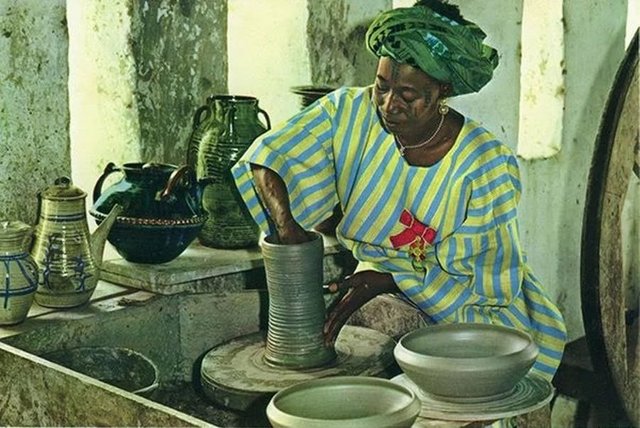Ladi Kwali was born in the village of Kwali in the Gwari region of Northern Nigeria, where pottery was an indigenous female tradition.[ She learned to make pottery as a child by her aunt using the traditional method of coiling. She made large pots for use as water jars, cooking pots, bowls, and flasks from coils of clay, beaten from the inside with a flat wooden paddle. They were decorated with incised geometric and stylised figurative patterns, including scorpions, lizards, crocodiles, chameleons, snakes, birds, and fish. She would impress patterns on top of the figures by rolling small roulettes of twisted string or notched wood over the surface of the clay, sometimes as horizontal banding and sometimes in vertical panels.The wooden roulettes consisted of small cylinders of hard wood, two or three inches long and a half-inch in diameter, notched with straight, oblique, or parallel patterns.The earthenware vessels and decorative techniques have been dated back to neolithic periodFollowing the region's traditional method, they were fired in a bonfire of dry vegetation. Her pots were noted for their beauty of form and decoration, and she was recognised regionally as a gifted and eminent potter.Several were acquired by the Emir of Abuja, Alhaji Suleiman Barau, in whose home they were seen by Michael Cardew in 1950.
She learned to make pottery as a child by her aunt using the traditional method of coiling. She made large pots for use as water jars, cooking pots, bowls, and flasks from coils of clay, beaten from the inside with a flat wooden paddle. They were decorated with incised geometric and stylised figurative patterns, including scorpions, lizards, crocodiles, chameleons, snakes, birds, and fish. She would impress patterns on top of the figures by rolling small roulettes of twisted string or notched wood over the surface of the clay, sometimes as horizontal banding and sometimes in vertical panels.The wooden roulettes consisted of small cylinders of hard wood, two or three inches long and a half-inch in diameter, notched with straight, oblique, or parallel patterns.The earthenware vessels and decorative techniques have been dated back to neolithic periodFollowing the region's traditional method, they were fired in a bonfire of dry vegetation. Her pots were noted for their beauty of form and decoration, and she was recognised regionally as a gifted and eminent potter.Several were acquired by the Emir of Abuja, Alhaji Suleiman Barau, in whose home they were seen by Michael Cardew in 1950.
Authors get paid when people like you upvote their post.
If you enjoyed what you read here, create your account today and start earning FREE STEEM!
If you enjoyed what you read here, create your account today and start earning FREE STEEM!
Hi! I am a robot. I just upvoted you! I found similar content that readers might be interested in:
https://en.wikipedia.org/wiki/Ladi_Kwali
Downvoting a post can decrease pending rewards and make it less visible. Common reasons:
Submit
okay how would you help
Downvoting a post can decrease pending rewards and make it less visible. Common reasons:
Submit